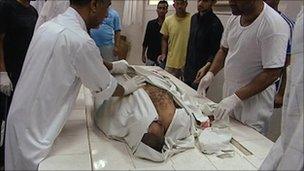Human rights groups concerned over Bahrain crackdown
- Published

Rights groups say four people have died in custody
Human rights groups have expressed mounting concern about a security crackdown under way in Bahrain.
Physicians for Human Rights (PHR) says there have been attacks on physicians, patients and unarmed civilians since protests began in February.
It says at least 32 medics have been arrested - some by masked men in the middle of the night. It believes they were targeted because they have seen evidence of abuses by security forces.
The government denies the reports.
On Thursday, British Foreign Secretary William Hague said reports from Bahrain of arrests and torture of detainees were "extremely troubling".
He called on the government to act in accordance with the law and to investigate any abuses fully and transparently.
Disturbing accounts
"The excessive use of force against unarmed civilians, patients in hospitals and medical services that PHR's investigators documented is extremely troubling and is cause for an immediate international investigation," said Hans Hogrefe, Physicians for Human Rights' Washington director.
The group spoke to one man who says he was injured with birdshot in March but was too scared to go to hospital. "He said that, with an unsterilised knife, he dug out approximately 70 metal pellets from his arm and leg," the report says.
Another man who had protested at Pearl Roundabout says he was beaten in hospital after being shot in the face and head with birdshot.
According to the report: "Police in blue uniforms and men in civilian dress wearing black masks stormed the ward and beat Ali and other patients with the butts of their rifles and kicks to the groin, stomach and flanks."
It also says that in April, six Shia physicians at the main hospital, Salmaniyah, were beaten after security forces found a picture of the prime minister missing from the wall of a staff lounge.
Among those listed by Physicians for Human Rights as having been arrested are ambulance workers and surgeons.
Government denial
The Bahraini authorities have denied targeting medics, saying it was "wholly false" to suggest that doctors were being indiscriminately arrested or targeted.
Government spokesperson Maysoon Sabkar said some of Bahrain's main medical facilities "had been overrun by political and sectarian activity".
"This extended beyond the spreading of malicious propaganda to the blocking of medical care, severely interrupting services and endangering life," she said.
"Those responsible are being investigated and will be held to account in the proper, legal manner," she added.
But the contents of the Physicians for Human Rights report tally with a strongly-worded report by the aid organisation, Medecins Sans Frontieres, earlier this month which said that health facilities had become "places to be feared" and that protesters were being identified for arrest by their wounds.
And it comes as human rights workers speak of a climate of increasing fear in Bahrain, where martial law was imposed last month.
Climate of fear
Hundreds of people have been detained and others have lost their jobs for taking part in protests.
Amnesty International says many of those arrested are being held incommunicado: "In virtually all cases, weeks after their arrest, their whereabouts remain unknown."
Human rights groups have also documented four deaths in custody.
The International Committee of the Red Cross, which visits detainees in conflict situations, has been pushing since mid-March to be allowed to see those detained in Bahrain.
But so far the Bahraini authorities have not granted it permission.
Speaking in London on Thursday, William Hague, said: "The arrests of opposition figures, the reports of deaths in custody, allegations of torture and the denial of medical treatment, are extremely troubling.
"I call on the government to investigate them fully and transparently. I urge the Bahraini authorities to act in accordance with the law and to meet international standards for the treatment of detainees."
"Events across the Middle East have shown that governments need to respond with reform and not repression if they are to enhance the long-term stability and prosperity of their countries," he added.